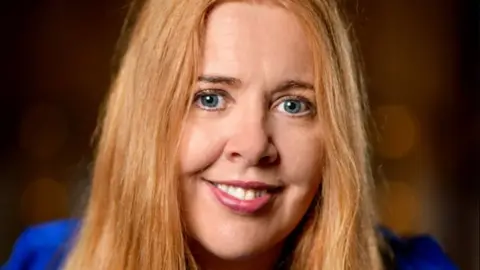'How my ADHD became my superpower'
 Creative Camera Media
Creative Camera MediaA successful businesswoman who was only diagnosed with attention deficit hyperactivity disorder (ADHD) at the age of 52 has described it as her "superpower".
Celia Gaze, who has owned an events venue business in Bolton for the last decade, was only diagnosed with the condition a year ago.
She said that while her ADHD allowed her to "work and work" because once she has an idea in her head "it has to be implemented", there was often a high price to pay.
Celia said the flipside of having unusually high levels of hyper-focus and energy was the risk of burnout - something she said she experienced while working in a senior NHS management role.
Henry Shelford, chief executive of the ADHD UK charity, said: "Yes, it can be a superpower, but there is kryptonite."
And he explained that when people with ADHD are struggling it is important for them to look at what can be changed to help them "access their superpower" rather than struggle so much.
ADHD UK said "woefully long" waiting times for a diagnosis were preventing many people from accessing the support they needed, with some "often having to wait two years for an assessment".
 Dave Spink Photography
Dave Spink PhotographyCelia said: "I've always worked crazy hours, non-stop, and I have this ability to be creative - I put it all down to my diagnosis.
"Because of the non-stop nature I am more prone to experience work-related stress and burnout more often than others."
It was not until after Celia had written about transforming her husband's farm into a sustainable wedding and events venue that she really looked into her neurodiversity.
It was prompted by a reader of her book saying: "You've got ADHD."
ADHD UK believes 2.6m people have the condition in the UK, of whom 80% are undiagnosed.
The charity arrived at these figures by working with NHS prescription records and data from the National Institute for Health and Care Excellence (Nice) and the Office for National Statistics.
'It's like you are in a maze'
Celia said her diagnosis had made a big difference to her life, in that she has "been a lot kinder to herself" and not so self-critical.
At times of difficulty, she said she now knew "it's not me, I'm not failing".
Mr Shelford added: "When you have undiagnosed ADHD, it's like you are in a maze and the lights are off.
"With a diagnosis comes an understanding, the lights come on and you can navigate, it's life-changing."
 Ted Lawlor
Ted LawlorTed Lawlor, from London, was also diagnosed with ADHD last year, aged 24.
"Looking back, I struggled all my life but didn't understand why," he said, adding: "It affected me in all walks of life."
At school, Ted said he would only do well in subjects he enjoyed and was able to "hyper-focus" on, and struggled with others.
After he left school, Ted said his undiagnosed ADHD "really hit" him when he entered the workplace.
"I was trying to figure out what was wrong with me," he said. "I could not work out how everyone around me could work 9am-5pm with no distractions."

Attention Deficit Hyperactivity Disorder
- ADHD can be categorised into two types of behaviour: inattentiveness and hyperactivity
- Many people with the condition experience both, but this is not always the case
- The condition is more often diagnosed in boys than girls
- It can be treated using medicine or therapy; often a combination is most effective

Ted's experiences are not uncommon, said Mr Shelford, with undiagnosed ADHD often leading to a "relationship between the individual and their employer being undermined".
Advice given to neurotypical people by managers may not be appropriate or helpful to those with ADHD, leading to misunderstandings.
Mr Shelford said: "The boss can think they are going from being helpful to being ignored."
Ted said his diagnosis had led to him identifying better coping strategies and, as a result, was not just "coping" but "thriving".
One method had been for him to start working in intervals, such as "working for 20 minutes followed by five minutes of rest".
Many neurodiverse people develop coping mechanisms way before they are diagnosed.
Mr Shelford added that these often "have costs - they are not ideal and then you have to unravel and rebuild... this is a tough thing to do".

Why not follow BBC North West on Facebook, Twitter and Instagram? You can also send story ideas to [email protected]
